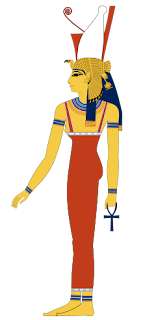A detail of the creation of Adam on the ceiling of the Sistine Chapel, painted by Michaelangelo.
The Bible teaches us that human beings were created in the image of God. “And God said: 'Let us make man in our image, after our likeness…” (Genesis 1:26). Both Judaism and Christianity teach that God does not have a physical image because he is a spirit. Hence, it is forbidden to make idols to represent God. The religions of the neighboring peoples in Canaan and even neighboring nations like Egypt and Babylon are depicted as idols. But the God of Abraham, Isaac, and Jacob alone is not represented by any image.
The ancients created gods and goddesses in
the image of creation. For example in Egyptian mythology, the gods were
depicted as human beings or half-human half-animal. This is perhaps to imbue
the god with the power and attributes of the animals in which they were created.
(All of the following images are from Wikipedia.)
Anuket, the goddess of the Nile, is
represented in the form of a human female; perhaps as a personification that
the river is the “mother” of civilization.
Anubis, the god of the dead, is represented
by the jackal, seen as a scavenger of dead bodies.
Atum, the finisher of creation, is depicted
as a man.
Bastet, the goddess of cats, has the head of a cat. Cats are revered as gods among the ancient Egyptians.
Hapi is the god of floods. He brings crops
with him because when the Nile overflows its banks, it irrigates the fields.
Hathor is the goddess of love, beauty,
motherhood, foreign lands, and music.
Isis, the mother god, is the goddess of
motherhood, fertility, and magic.
Khepri, the god of sunrise and rebirth, is
represented as a dung beetle. It rolls dung into a ball, symbolizing the sun.
Khnum, the god of the waters and creation,
has the head of a goat.
Khonsu, the god of the moon and youth,
wears the moon on his head.
Maat is the goddess of truth and justice.
Meretseger, the goddess of tomb builders,
is represented by a snake.
Meskhenet is the goddess of childbirth. She
wears a cow’s uterus on her head.
Monthu, the god of warfare, valor, and the sun. He is also depicted as a falcon.
Mut, the lady of heaven, is the goddess of
queens.
The sun-god Ra is also a falcon, with the
sun on his head.
Sekhmet, the goddess of war, vengeance, fire,
and also of medicine and healing, is represented the fiercest of hunters, the
lioness.
Set, the god of the desert, is depicted as a jackal or wolf.
Meanwhile, the gods and goddesses of Greek
mythology were created in the image of man. To the Greeks, the human being is
the most perfect of all creation.


Zeus is the king of the gods, the god of
sky and thunder. But he is also depicted as a womanizer. (“Power is the
greatest aphrodisiac.”) This is a result of the spread of the cult of Zeus.
When Zeus is introduced to a city, he is assimilated into whoever the ultimate
male deity was. This also includes that deity’s wife.
Hera is the queen of the gods and the wife
of Zeus. She always opposes Zeus and is always suspicious of his motives. She
is depicted as a vengeful woman, making the women linked with her husband
suffer.
Poseidon is the god of the sea. He is the patron god of Greece who were great seafarers and lovers of the sea.
Hades is god of death and the underworld. With him is his three-headed dog, Cereberus.
Pallas Athena, the goddess of wisdom,
sprung from the head of Zeus himself. She alone is entrusted to wear his
helmet, the Aegis, and wield his thunderbolt.
Phoebus Apollo is the god of the sun and
also of the truth, because nothing escapes from the eye of the sun. He is also
the god of music, with the lyre which is a gift from Hermes.
Artemis is the goddess of the hunt when she
is on earth. In the sky, she is Selene or Cynthia, the goddess of the moon.
Under the earth, when the moon is hidden, she is Hecate, the goddess of
darkness.
Aphrodite is the goddess of love and beauty.
Hermes is the messenger of the gods,
wearing winged sandals to make him faster than the wind. He is the god of
medicine, represented by his staff, the Caduceus. He is also the god of the
marketplace, and strangely, of thieves.
The lame god Hephaestus is the blacksmith of
the gods, maker of weapons and armor.
Hestia is the goddess of the hearth (fireplace), making
her a household goddess.
































No comments:
Post a Comment